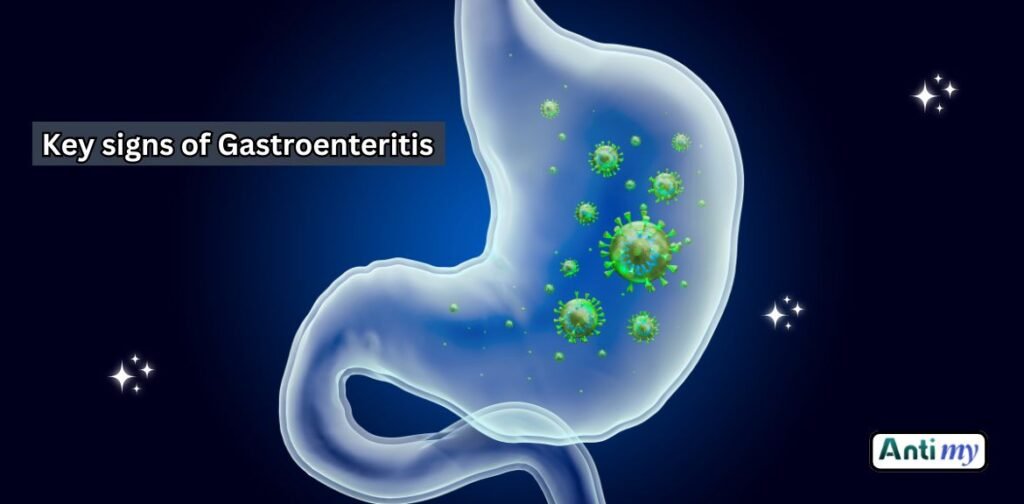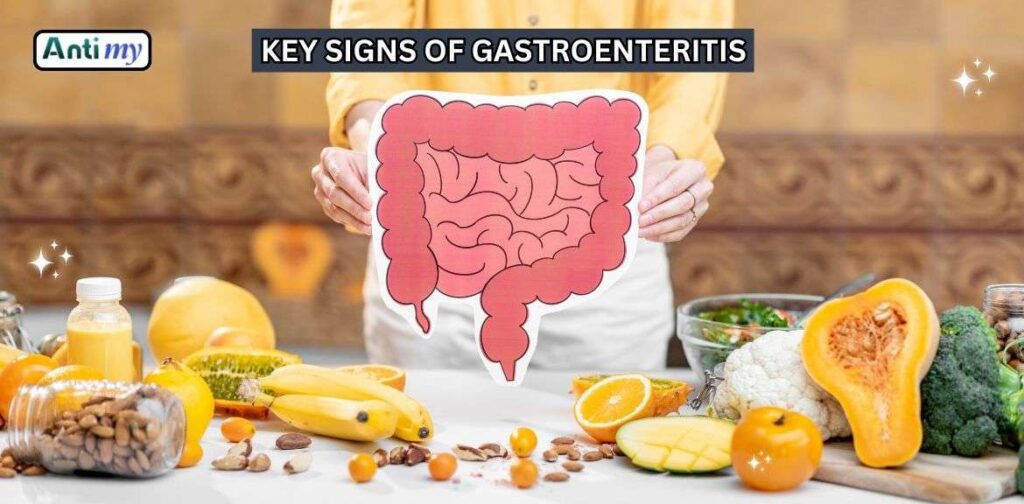Gastroenteritis, also known as the stomach flu, is a common condition characterized by inflammation of the stomach and intestine. In order to identify it quickly and treat it effectively, one must be aware of its symptoms. In this article, we are going to discuss gastroenteritis and we will also go through the key signs of gastroenteritis. Further, we will look into the cause and treatment of gastroenteritis. So to get all the information about the disease, you need to go through the article from top to bottom, and without any kind of restriction.
What is Gastroenteritis?
Gastroenteritis indicates gastrointestinal and stomach irritation. Inflammation causes these organs to swell and become sore, resulting in symptoms such as nausea, vomiting, abdominal pain, and diarrhea.
Gastroenteritis is commonly caused by an infection of the gastrointestinal (GI) tract. Food poisoning and stomach flu infections can be caused by bacteria and viruses.
key signs of Gastroenteritis

Gastroenteritis is characterized by symptoms pertaining to the intestines (diarrhea, cramps) as well as the stomach (nausea, vomiting). Given below are the list of top key signs of gastroenteritis are:-
- Diarrhea
- Nausea and vomiting
- Loss of appetite
- Abdominal pain and cramping
- Fever
- Chills
- Fatigue
- Body aches
Causes of Gastroenteritis
There are multiple reasons that cause gastroenteritis, but given below are a few common causes are;-
- Viral Infections: Viral infection is the leading cause of gastroenteritis. The most common causes, especially in adults and children, are the norovirus and rotavirus, respectively. The importance of detecting viral infections early on is highlighted by key signs of gastroenteritis.
- Bacterial Infections: Gastroenteritis can be brought on by bacteria including Campylobacter, Salmonella, Shigella, and E. coli. These microorganisms are frequently discovered in tainted food and water. You must identify the main symptoms of bacterial gastroenteritis. This is needed to get the right therapy.
- Parasitic Infections: Parasites, like Giardia and Cryptosporidium, can also cause gastritis. But, this is less common than bacterial or viral infections. key signs of gastroenteritis can help identify parasitic infections.
- Non-Infectious Causes: Gastroenteritis can also be due to non-infectious causes. These include toxins, food allergies, and some medications. Identifying the main symptoms of agents-caused gastroenteritis can help choose the right action.
Treatment of gastroenteritis
If you are one who is suffering from gastroenteritis then you do not have to worry, you just have to follow a few steps that will completely treat your gastroenteritis:-
1. Home Remedies
If you are suffering from mild cases of gastroenteritis, home remedies can be very effective. These include:
- Hydration: Consuming an adequate amount of fluids to replenish lost fluids and electrolytes, such as water, broths, or oral rehydration solutions.
- Rest: Allowing the body enough time to eliminate the infection.
- Diet: Eating easy-to-digest bland foods that are gentle on the stomach, such as toast, applesauce, rice, and bananas (also known as the BRAT diet).
2. Medical Treatments
If the case is serious then you need to follow the given below steps:-
- Intravenous (IV) Fluids: To treat severe dehydration.
- Medication: Antiemetic drugs, antidiarrheal drugs, and antibiotics (in the event that a bacterial infection is found).
Tips for Dealing with Gastroenteritis Symptoms
If you are undergoing gastroenteritis then you to follow the given below step to avoid gastroenteritis:
- Hand washing: Especially before eating and after using the toilet, thoroughly wash your hands with soap and water.
- Food safety: Make sure food is properly kept and cooked to safe temperatures. Steer clear of undercooked or uncooked food.
- Clean Water: Only consume safe, clean water. Use bottled or purified water instead of tap water when traveling.
- Vaccines: Protecting young children against severe gastroenteritis is possible with vaccines such as the rotavirus vaccine.
Conclusion
Let’s sum up! Gastroenteritis can be a bothersome and disruptive condition, but understanding its main signs and symptoms, causes, and treatment options can help you cope more effectively. You can avoid getting this common infection by staying very clean. Also, by making sure food is safe. And by knowing when to seek medical help. Reduce the effects of gastroenteritis by managing your health with knowledge and initiative.
FAQs
If you are one who is undergoing a gastroenteritis problem then you need to worry, you just have to follow a few prescriptions and within 10 days the problem will be completely removed.
Although there is no certain diet that will prevent gastroenteritis, risk can be decreased by practicing excellent food hygiene, avoiding undercooked foods, and using pasteurized milk.
Yes, it is possible for gastroenteritis to spread widely. It can spread via contact with an infected person, contaminated food, or tainted water.
Gastroenteritis rarely results in severe dehydration or chronic digestive issues, but in rare instances, it can, particularly if treatment is inadequate.
Disclaimer: Every detail that has been written in the article is well researched and is used only for the informational purpose. Thus, the website does not recommend any kind of medicine. If you undergo this problem, take advice from your doctor.

